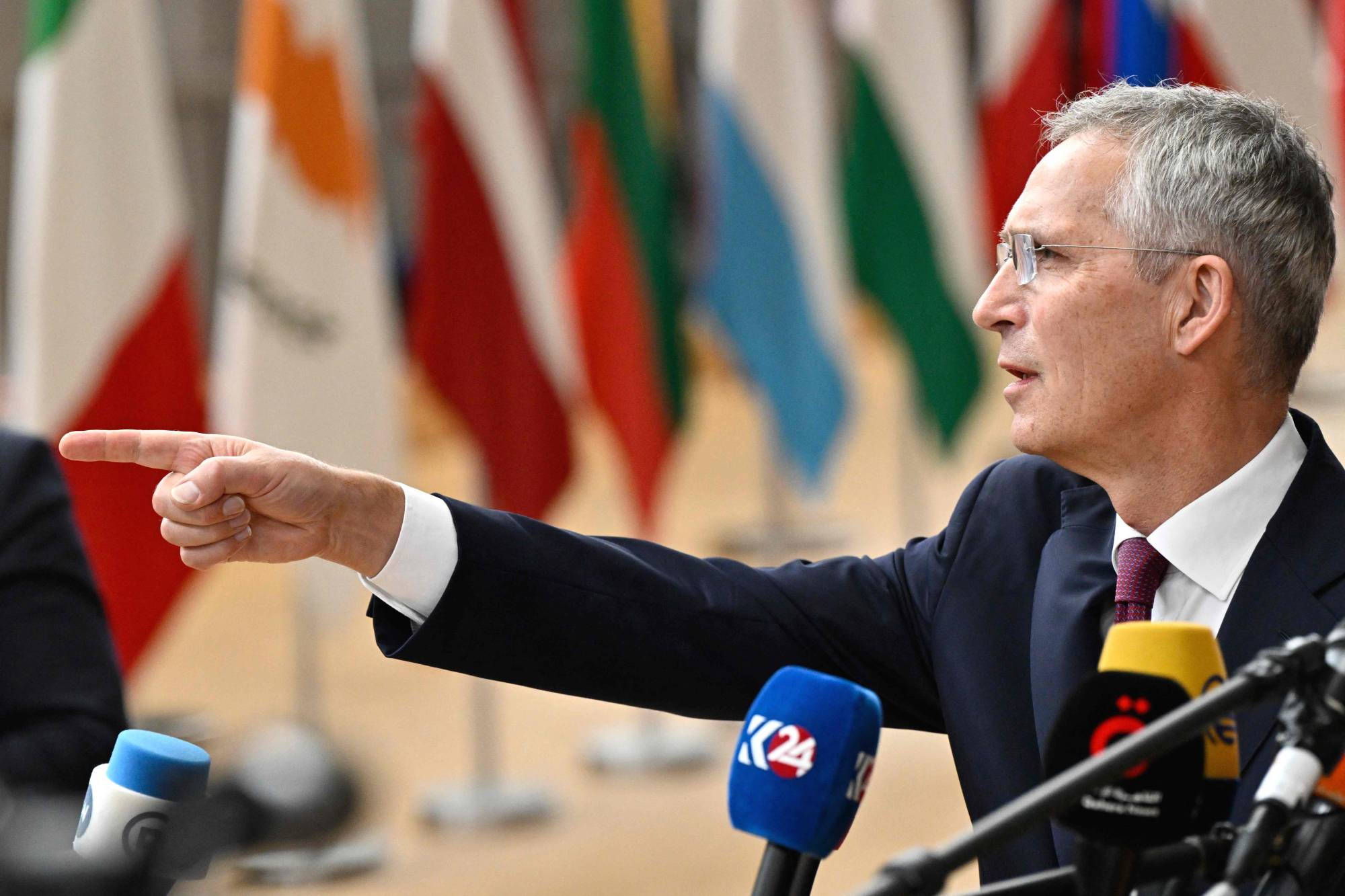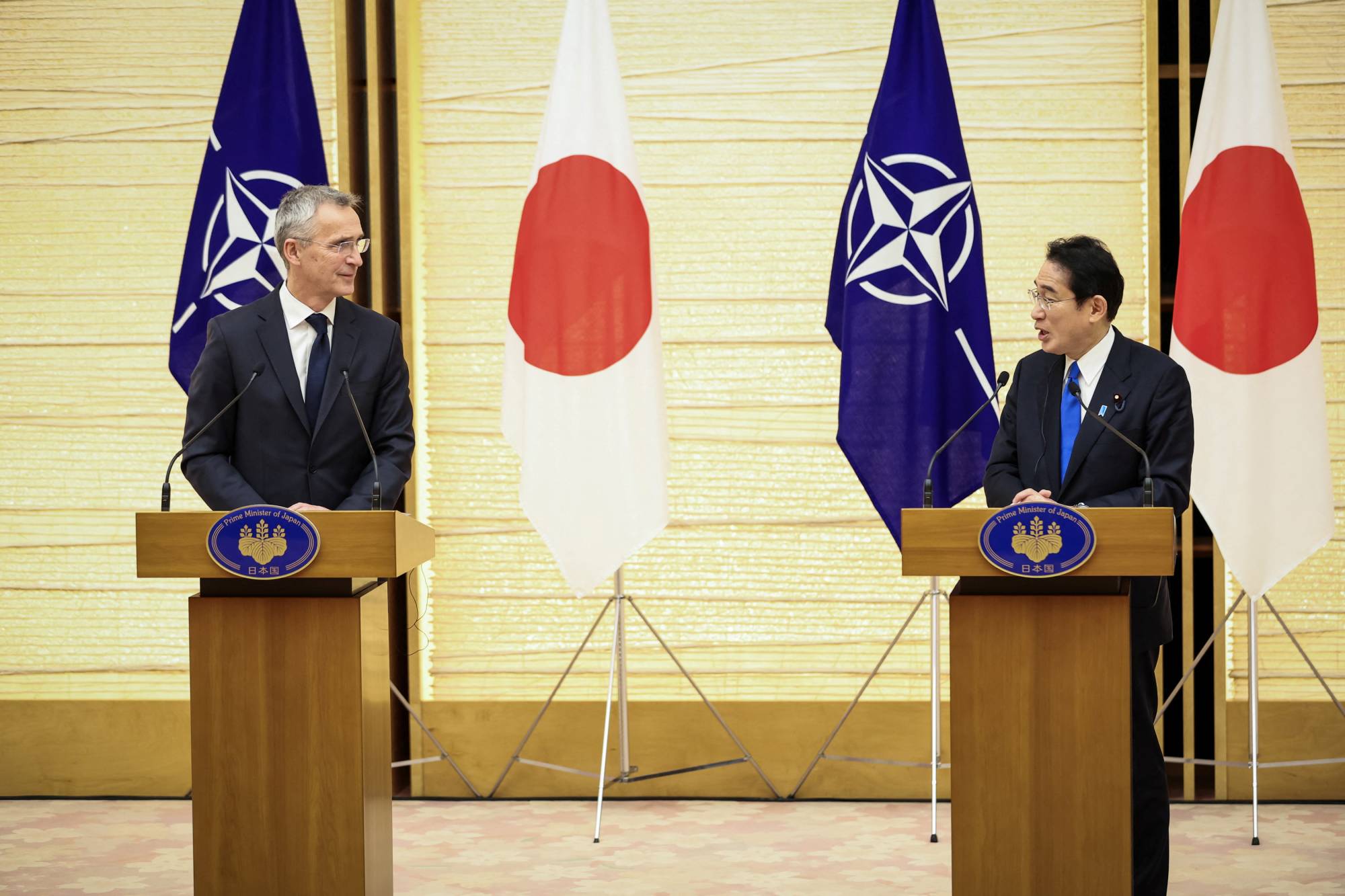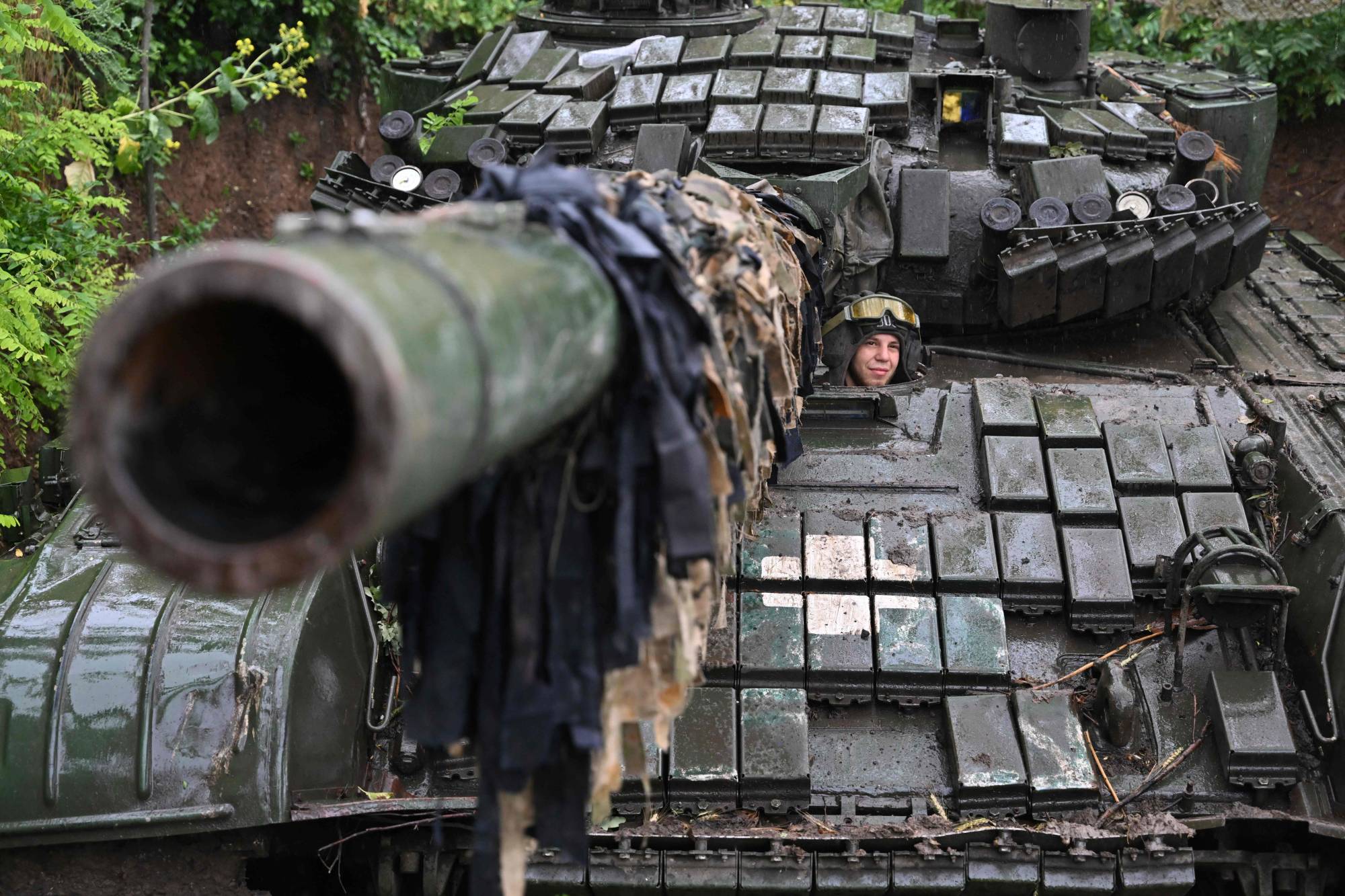GABRIEL DOMINGUEZ
 More support for Ukraine, a new NATO office in Tokyo and a new partnership agreement with the world’s most powerful military alliance are set to top Prime Minister Fumio Kishida’s agenda when he attends the NATO leaders’ summit in Vilnius, Lithuania, next week.
More support for Ukraine, a new NATO office in Tokyo and a new partnership agreement with the world’s most powerful military alliance are set to top Prime Minister Fumio Kishida’s agenda when he attends the NATO leaders’ summit in Vilnius, Lithuania, next week.Kishida, who last year became the first Japanese prime minister to attend such a gathering, is set to join the summit on July 11 and 12 with the leaders of South Korea, Australia and New Zealand. Informally known as the Asia-Pacific Four, these countries, which have been part of NATO’s “global partners” group since the early 2010s, are also expected to enter deeper partnerships with the trans-Atlantic alliance.
The planned transition to NATO’s new Individually Tailored Partnership Program (ITPP) later this year also appears far more advanced than initially reported, with the Vilnius summit likely to see the new partnerships approved for each of the four countries, Jamie Shea, a former deputy assistant secretary-general for emergency security challenges at NATO, told The Japan Times.
“The ITPPs have been negotiated and approved at the ambassador level,” said Shea, who is now a professor at the University of Exeter in England, adding that the leaders would use the summit to “endorse and highlight them as a mark of progress.”
What exactly the ITPPs will mean for each of the Asia-Pacific countries is not entirely clear, as few details have emerged. In general, however, these engagement frameworks — based on a partner’s individual capacities, needs and interests — provide opportunities to develop interoperability with NATO militaries as well as a platform for engaging and sharing information about a variety of security issues.
"Adopting the ITPPs will surely be an important development, but it is mainly a bureaucratic innovation," said Michito Tsuruoka, an international security expert and associate professor at Keio University, adding that what will matter most is what new kinds of cooperation will become possible under the framework.
Japan sees closer cooperation with NATO as a means of expanding its security engagement with its members. The aim is to strengthen deterrence by forging closer strategic ties and interoperability, while simultaneously building bridges between U.S. alliances in both the trans-Atlantic and Indo-Pacific regions, said Celine Pajon, a Japan expert at the French Institute of International Relations. NATO Secretary-General Jens Stoltenberg talks to reporters as he arrives for a European Council Summit, at EU headquarters in Brussels on Thursday. | AFP-JIJI
NATO Secretary-General Jens Stoltenberg talks to reporters as he arrives for a European Council Summit, at EU headquarters in Brussels on Thursday. | AFP-JIJI
 NATO Secretary-General Jens Stoltenberg talks to reporters as he arrives for a European Council Summit, at EU headquarters in Brussels on Thursday. | AFP-JIJI
NATO Secretary-General Jens Stoltenberg talks to reporters as he arrives for a European Council Summit, at EU headquarters in Brussels on Thursday. | AFP-JIJIAt the same time, by engaging as many partners as possible, Tokyo aims to avoid being caught in a precarious position between Washington and Beijing, the expert said. Pajon said that Japan’s ITPP will likely aim to facilitate information-sharing, enhance resilience against common threats and address challenges in cyberspace, outer space and maritime domains.
At the summit itself, Kishida is expected to emphasize the importance of Japan-NATO cooperation for securing the Indo-Pacific, and by doing so help to further entrench Tokyo’s own security agenda, said Sebastian Maslow, a Japan security expert and lecturer at Sendai Shirayuri Women's College.
“Similar to Kishida’s initiative at the G7 summit, I would also expect Tokyo to emphasize the specific regional security threats posed, for example by China with regard to maritime security and peace across the Taiwan Strait, or by North Korea’s missile and nuclear programs," Maslow said.
Kishida, who will visit the alliance’s headquarters in Brussels after the summit, is also likely to work toward connecting growing security frameworks such as “the Quad” and multilateral groupings with NATO.
“Improving coordination in this way is important to avoid the complex web of overlapping cooperation agreements emerging between different Atlantic and Pacific nations from becoming a burden to navigate,” said James Black, assistant director of defense at Rand Europe, part of the nonprofit Rand Corp. “Otherwise, the risk is that these frameworks become talking shops, rather than the basis for concrete actions.”
Japan, which has already joined NATO for several cyber, air and naval exercises, has also expressed its intention to regularly participate as an observer in the North Atlantic Council — the alliance’s principal political decision-making body — as well as its meetings of defense chiefs.
Meanwhile, Kishida will also want to make the case for setting up a liaison office in Tokyo — which would be the alliance’s first in Asia — sometime next year. NATO Secretary-General Jens Stoltenberg and Prime Minister Fumio Kishida hold a joint media briefing on Jan. 31 in Tokyo. | POOL / VIA REUTERS
NATO Secretary-General Jens Stoltenberg and Prime Minister Fumio Kishida hold a joint media briefing on Jan. 31 in Tokyo. | POOL / VIA REUTERS
 NATO Secretary-General Jens Stoltenberg and Prime Minister Fumio Kishida hold a joint media briefing on Jan. 31 in Tokyo. | POOL / VIA REUTERS
NATO Secretary-General Jens Stoltenberg and Prime Minister Fumio Kishida hold a joint media briefing on Jan. 31 in Tokyo. | POOL / VIA REUTERSResistance from French President Emmanuel Macron has complicated the move, with Paris saying NATO should remain focused on its own region. To try and persuade France, which could veto the plan, other member states are expected to argue that the office will be critical to implementing Individually Tailored Partnership Programs.
“If the opening of a modest NATO office in Tokyo is directly linked to coordinating the ITPP with local partners, it may be more acceptable to France,” said Pajon.
That said, most discussions at the NATO summit will revolve around the war in Ukraine and how the alliance can increase support for Kyiv. Ukrainian Defense Minister Oleksii Reznikov said last month that Kyiv expects to receive a clear signal and "formula" at the summit for the country to join the alliance.
Experts, however, doubt that NATO will go that far.
“It seems Ukraine will not be offered a clear timeline to membership, but only an enhanced partnership and a clear reiteration of the prospect for its future membership,” said Paal Sigurd Hilde, a NATO expert at the Norwegian Institute for Defense Studies.
Ukraine will not be able to join NATO while the war continues, as under the alliance's Article 5 this would commit the allies to entering the war against Russia.
Currently, the allies are debating a package of measures for Ukraine which, while short of actual membership, will show that the NATO-Ukraine relationship is moving forward, according to Shea.
One initiative under discussion is to upgrade the NATO-Ukraine Commission — a joint consultative mechanism — into a council, while another would be to launch a NATO program and fund to assist the Ukrainian army in becoming fully interoperable with the alliance and adhering to its standards. Such a program would facilitate Ukraine’s integration at a later stage.
A third proposal, coming from NATO Secretary-General Jens Stoltenberg, is not to apply NATO’s Membership Action Plan (MAP) to Ukraine and say that Kyiv has already met many of the political and military requirements for membership.
“The requirement for a MAP was waived in the case of Finland and Sweden so they could be fast-tracked into the alliance,” Black said. “Some NATO allies are thus asking why Ukraine should have to jump through this hoop, especially when its armed forces have proven their capabilities on the battlefield."
The idea is that once the war is over, a membership decision can be taken fairly quickly. A Ukrainian serviceman sits on a T-72 tank at a position in the country’s Donetsk region on Sunday. | AFP-JIJI
A Ukrainian serviceman sits on a T-72 tank at a position in the country’s Donetsk region on Sunday. | AFP-JIJI
 A Ukrainian serviceman sits on a T-72 tank at a position in the country’s Donetsk region on Sunday. | AFP-JIJI
A Ukrainian serviceman sits on a T-72 tank at a position in the country’s Donetsk region on Sunday. | AFP-JIJIThe allies may also discuss security guarantees for Ukraine short of NATO membership, although Kyiv expects these will be supplied on a bilateral basis by the United States and European countries such as Britain or Poland, rather than the full alliance.
Allies will also commit to supporting Ukraine with weapons and military assistance for the longer term as few believe that a Ukrainian offensive, even if successful, will enable the country to liberate all of its occupied territories for the foreseeable future, Shea said.
Besides deepening engagements with the like-minded Asia Pacific nations, other topics on the NATO agenda will be the approval of defense plans for Central and Eastern Europe and enhancing the allies’ resilience against hybrid threats from both Russia and China.
Other key issues will be the position of Turkey and Hungary on Sweden’s NATO membership, and the alliance’s defense spending targets. Member states are looking to agree on 2% gross domestic product as the minimum the allies are expected to devote to defense, re-framing the spending pledge as “a floor, not a ceiling,” according to Black.
Increasing support for Ukraine is also something that is expected to be high on Kishida’s agenda. Japan’s reaction to the Ukraine conflict has not only been swift but also comprehensive, with Tokyo providing Kyiv with a mix of humanitarian, financial and nonlethal military aid in the form of surveillance drones, bulletproof vests, helmets, transport vehicles, tents and medical supplies.
Unlike the United States and many European countries, pacifist Japan has not delivered weapons due to guidelines that effectively ban arms exports. But the winds are shifting in Tokyo, as the ruling coalition looks to reach an agreement on how to modify the guidelines on the export of lethal weapons.
No comments:
Post a Comment